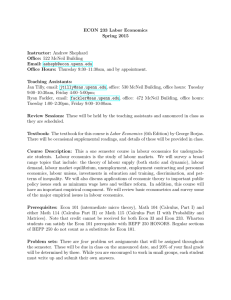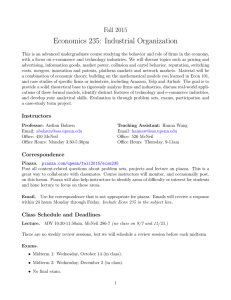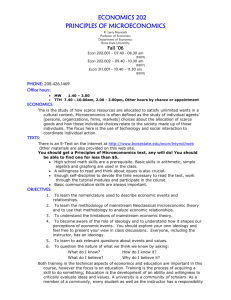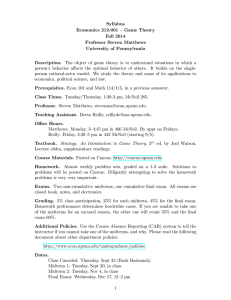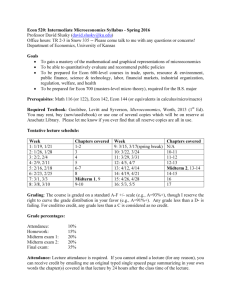ECON 233 Labor Economics Spring 2016 Instructor: Andrew Shephard Office: 522 McNeil Building
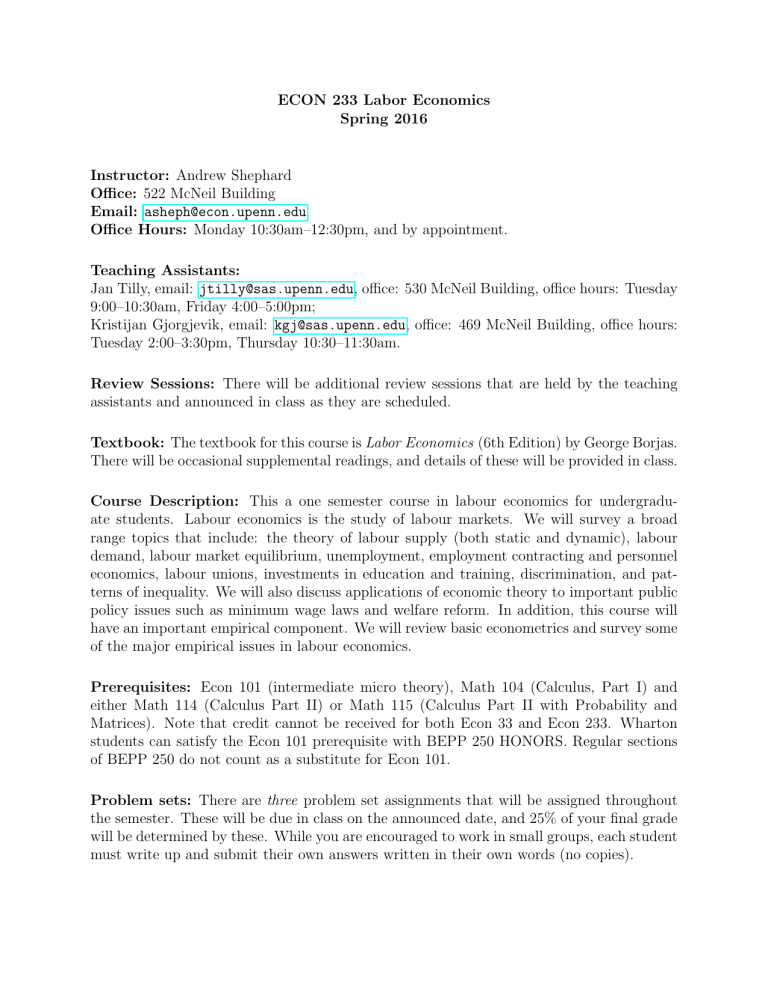
ECON 233 Labor Economics
Spring 2016
Instructor: Andrew Shephard
Office: 522 McNeil Building
Email: asheph@econ.upenn.edu
Office Hours: Monday 10:30am–12:30pm, and by appointment.
Teaching Assistants:
Jan Tilly, email: jtilly@sas.upenn.edu
, office: 530 McNeil Building, office hours: Tuesday
9:00–10:30am, Friday 4:00–5:00pm;
Kristijan Gjorgjevik, email: kgj@sas.upenn.edu
, office: 469 McNeil Building, office hours:
Tuesday 2:00–3:30pm, Thursday 10:30–11:30am.
Review Sessions: There will be additional review sessions that are held by the teaching assistants and announced in class as they are scheduled.
Textbook: The textbook for this course is Labor Economics (6th Edition) by George Borjas.
There will be occasional supplemental readings, and details of these will be provided in class.
Course Description: This a one semester course in labour economics for undergraduate students. Labour economics is the study of labour markets. We will survey a broad range topics that include: the theory of labour supply (both static and dynamic), labour demand, labour market equilibrium, unemployment, employment contracting and personnel economics, labour unions, investments in education and training, discrimination, and patterns of inequality. We will also discuss applications of economic theory to important public policy issues such as minimum wage laws and welfare reform. In addition, this course will have an important empirical component. We will review basic econometrics and survey some of the major empirical issues in labour economics.
Prerequisites: Econ 101 (intermediate micro theory), Math 104 (Calculus, Part I) and either Math 114 (Calculus Part II) or Math 115 (Calculus Part II with Probability and
Matrices). Note that credit cannot be received for both Econ 33 and Econ 233. Wharton students can satisfy the Econ 101 prerequisite with BEPP 250 HONORS. Regular sections of BEPP 250 do not count as a substitute for Econ 101.
Problem sets: There are three problem set assignments that will be assigned throughout the semester. These will be due in class on the announced date, and 25% of your final grade will be determined by these. While you are encouraged to work in small groups, each student must write up and submit their own answers written in their own words (no copies).
Exams: There will be three in-class midterm exams. There is no final exam. All exams are closed book, and no study aids are permitted. The first will take place on Wednesday
February 10th , and you will receive your grades in advance of the end of the course drop period. The second will take place on Wednesday March 23rd . The third midterm will take place on Wednesday April 27th (last day of classes). Note that this third midterm will also cover some core material from the early classes (guidance will be provided in class). Each midterm is worth 25% of your final grade. Attendance at all exams is mandatory and there will be no makeup midterms. In exceptional circumstances please contact the instructor in advance by email.
Regrade Requests: Problem set and examination regrade requests must be made in writing within a week of receiving your graded exam/problem set. All regrade requests should be made to the course instructor. Note that as we re-grade the entire exam/problem set, your score could rise or fall.
Piazza: We will be using an online discussion forum called Piazza for this course, which you can access directly from Canvas. Piazza is where we will make course announcements and answer questions about course material and logistics. By asking your question and getting an answer on Piazza, you create a positive externality: other students benefit from your questions and you benefit from theirs. The instructor and teaching assistants will actively moderate Piazza both to answer questions and approve (or correct) answers written by your fellow students. Students who actively participate in Piazza (by asking questions, answering questions, posting content relevant to the course, etc.) may earn extra credit equivalent to up to 5%.
Departmental Course Policies: All Economics Department course policies apply even if they are not explicitly listed here. See: http://economics.sas.upenn.edu/undergraduateprogram/course-information/guidelines/policies for full details.
